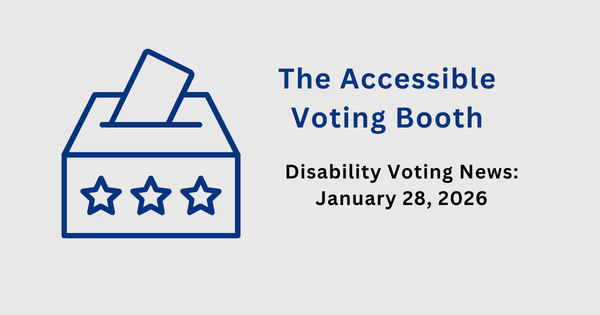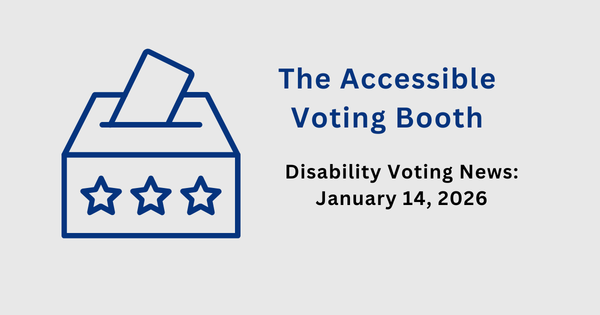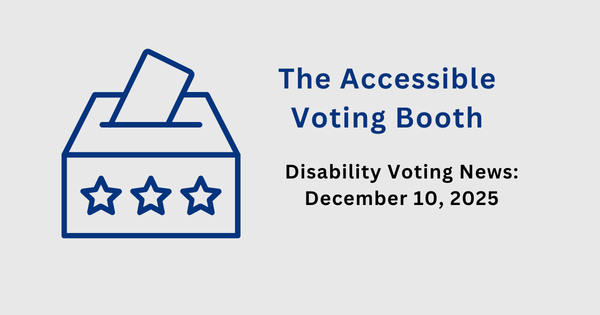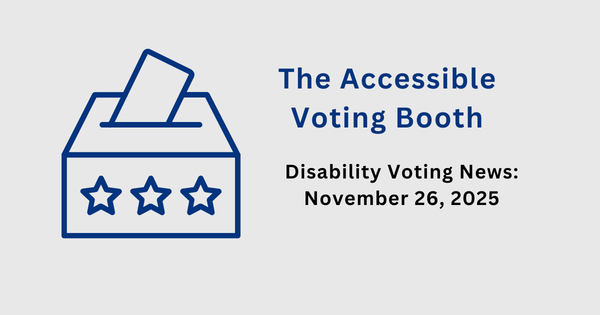Disability Voting News: July 2, 2025
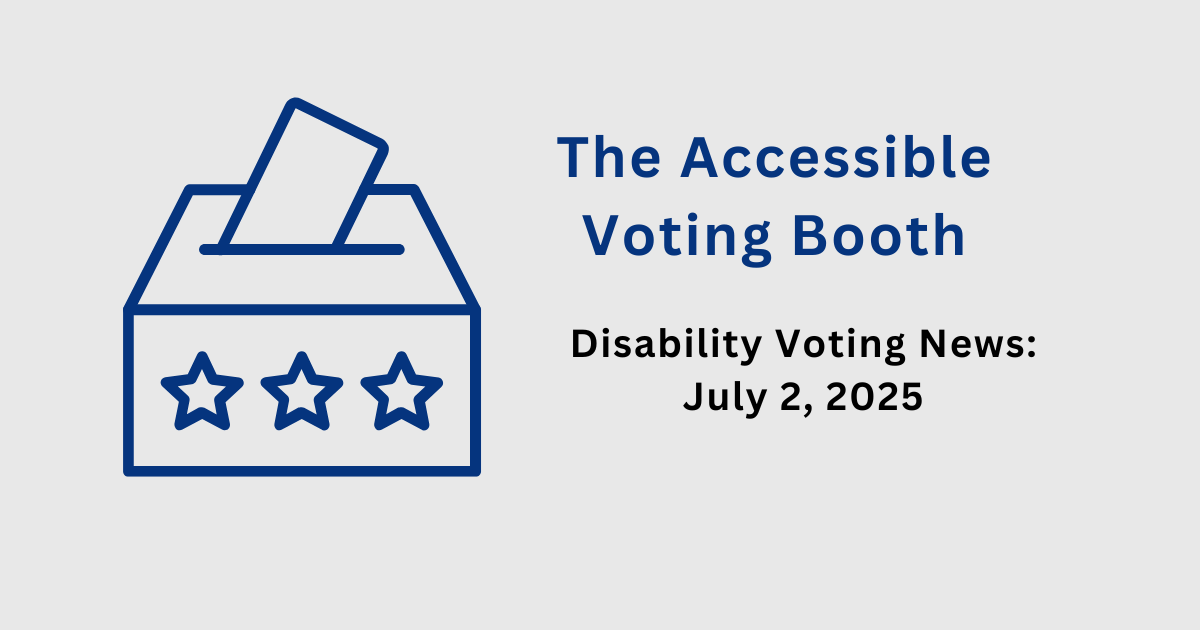
Welcome to The Accessible Voting Booth for July 2nd, 2025. We’ve made it halfway through 2025, which is no small feat. It’s also the beginning of Disability Pride Month, but it’s hard to feel any joy right now as the Senate passed Trump’s “big beautiful bill,” which contains the largest cuts to Medicaid in history. If it passes the House, nearly 12 million Americans will lose access to health insurance by 2034. Additionally, this legislation cuts food assistance and provides an additional $155 billion for Trump’s cruel mass deportation agenda, and ICE will have a budget larger than that of the Marines.
I’m grateful to the countless advocates who have been fighting this bill every step of the way and know that the battle is not over yet. Call the Capitol Switchboard at 202-224-3121 (or use this tool from the AFL-CIO) to contact your representative’s office and tell them to vote no on cuts to Medicaid.
This week, we have several developments out of New Hampshire, some upcoming workshops, and a piece highlighting the important work of Protection and Advocacy agencies.
Join two upcoming Disability Victory workshops to hone your advocacy skills (via Disability Victory).
Join Disability Victory in July for two free workshops featuring board members Rebecca Lamorte and Dom Kelly! Both workshops will have American Sign Language interpretation and CART captioning and will be recorded and posted on our YouTube channel after the event.
What is lobbying, who does it, and how can it make you a better advocate? Join Disability Victory board member and lobbyist Rebecca Lamorte on Thursday, July 10 at 2:00 Eastern to learn about how lobbying can influence the legislative process. You’ll learn the basics of lobbying and how different groups engage in lobbying, debunk myths about the practice, hear examples of how lobbying has been used to advance disability advocacy, and learn techniques and best practices. Register for Introduction to Lobbying.
On Monday, July 14 at 1:30 Eastern, join New Disabled South Co-Founder, President, and CEO for All Politics Are Local: Organizing for Change at a Local Level. At a time when progressive change at the federal level feels more challenging than ever, it’s crucial to turn to our local communities to organize for progress. During this training, hear from New Disabled South Rising Co-Founder and Disability Victory board member Dom Kelly about how we can fight for change at the local government level. Learn about how local government impacts our lives and the different opportunities for advocacy in local government, hear case studies of local advocacy efforts, and learn best practices for local organizing. Register for All Politics are Local.
Bipartisan Policy Center highlights Protection and Advocacy Agencies’ critical work on voting access (via Bipartisan Policy Center).
In light of the threats to P&A funding under the Trump Administration, it was great to see the Bipartisan Policy Center discuss the importance of P&As’ work on voting accessibility and community living. In this piece, they give an overview of the Protection and Advocacy for Voting Accessibility (PAVA) program established by the Help America Vote Act (HAVA) of 2002. Despite the fact that PAVA funding is a very small part of the Administration for Community Living’s budget (only 0.377 percent, in fact), P&As do critically important work to ensure that disabled people can vote privately and independently.
BPC highlighted how Disability Rights Wisconsin works with state and local election officials on polling place accessibility, alerts officials to access barriers at the polls, and developed guidance on assisting residents of nursing homes and care facilities with voting. They also discussed how P&As monitor polling place accessibility:
“P&As play a critical role in monitoring polling place accessibility. For example, the Disability Law Center (DLC), Utah’s P&A, surveyed the accessibility of ballot boxes in the state’s 29 counties during the 2022 election cycle. The Disability Law Center collected data on parking, voters’ route to the ballot box, the presence of ramps, and the accessibility of the ballot box itself, and prepared a report on ballot box accessibility at the state and county level. DLC uses their report to educate election administrators in Utah and provide technical assistance to election administrators looking to improve voting accessibility in their counties.”
Please read the full piece and share it with your networks to raise awareness of the important work that P&As are doing around the country!
New Hampshire Senate passes legislation to make accessible voting system pilot program for local elections permanent (via Voting Rights Lab).
In the April 16 issue of The Accessible Voting Booth, I covered HB 67, which had just passed the House:
“This legislation aims to make permanent a six-month pilot program where the Secretary of State provides accessible voting systems for use in cities, towns, and school districts. In entering into this agreement with political subdivisions that have adopted an official ballot system, the Secretary of State would not only provide the accessible voting systems, but also provide guidance on programming ballots into the system and security and maintenance guidance. Additionally, the legislation would appropriate $100,000 for the fiscal year for the purpose of funding accessible voting systems.”
On June 26th, this legislation passed the Senate! This is great news, as the Help America Vote Act’s requirement for accessible voting machines only applies to federal elections. This pilot program gave jurisdictions the resources and support to ensure that local elections are also accessible to voters with disabilities, and it's exciting to know that this support will continue.
Unfortunately, the excitement about this bill is tempered by HB613, which I covered on June 18th. HB613 would create a process by which jurisdictions can be exempted from providing this voting equipment by posting a notice on their websites that they will not have accessible voting equipment for an upcoming local election. Voters with disabilities would have to request in writing that election officials provide accessible voting equipment for an election. This request would have to be submitted at least two months before Election Day. Which takes us to our next item…
New Hampshire voter sounds the alarm on HB613 (via Concord Monitor).
I was happy to see that New Hampshire voters with disabilities are pushing back and explaining how HB 613 will create more access barriers to voting for them, including Andrew Harmon, a resident of New Hampshire, who wrote a letter to the editor in the Concord Monitor:
“Some examples of just how this would hurt my ability to vote include a requirement that I have to notify my local town within 60 days of the election that I wish to use the accessible voting system. No other voter needs to notify the town how and if they want to vote, and if a first-time voter who can’t access printed materials doesn’t know about this requirement, they can’t easily find out.
“This also makes it more difficult as the burden for voting now shifts from the local municipalities to the individual voters, despite the municipalities being legally responsible for running the election. This can expose voters to potential intimidation by other members of the public.”
Harmon ends the letter to the editor by calling on New Hampshire residents to reject HB 613 and to accept HB 67. But that isn’t the only news coming out of New Hampshire…
New Hampshire House passes SB287 to require identity verification for mail ballot applications (via Voting Rights Lab).
On June 18th, I also covered SB287, legislation that would require mail ballot applicants to provide verification before they are issued a ballot by submitting a copy of photo ID, presenting ID in person to their local clerk, or including a notarized signature. The New Hampshire House also passed this legislation on June 26. New Hampshire disability rights advocates shared several concerns about this legislation and how it will impact voters who have difficulty traveling to an election office or accessing options for providing verification:
“Disability rights advocates in New Hampshire are rightfully concerned because this requirement will make it harder for people with disabilities, especially those who are homebound, to be able to vote. They point out that many people are unable to go into their city or town hall to request an absentee ballot. In New Hampshire, you have to have a specific qualifying reason to vote by absentee ballot such as having a disability or illness that prevents you from voting in person. It’s reasonable to assume that if someone has a disability or illness that prevents them from voting in person, they will probably have a hard time going in person to the clerk’s office to present ID.
“They also raised concerns about access to technology to print copies of their documents or have access to a notary to affirm their signature. Representative Ross Berry, the Republican who introduced SB 287, countered this by saying that New Hampshire offers digital notarization options. However, voters with disabilities may not be aware of these options, and we can’t yet know whether state or local election offices will make an effort to inform them of these options. These may also present barriers, as notaries usually charge a fee for notarizing documents.”
Thank you for reading this week’s edition of The Accessible Voting Booth! As always, if you’d like to support the newsletter and my work, here’s how:
- Subscribe to the Accessible Voting Booth newsletter.
- Share this newsletter with your network to spread the word about disability voting rights.
- Leave me a tip. Thank you for supporting my work!

